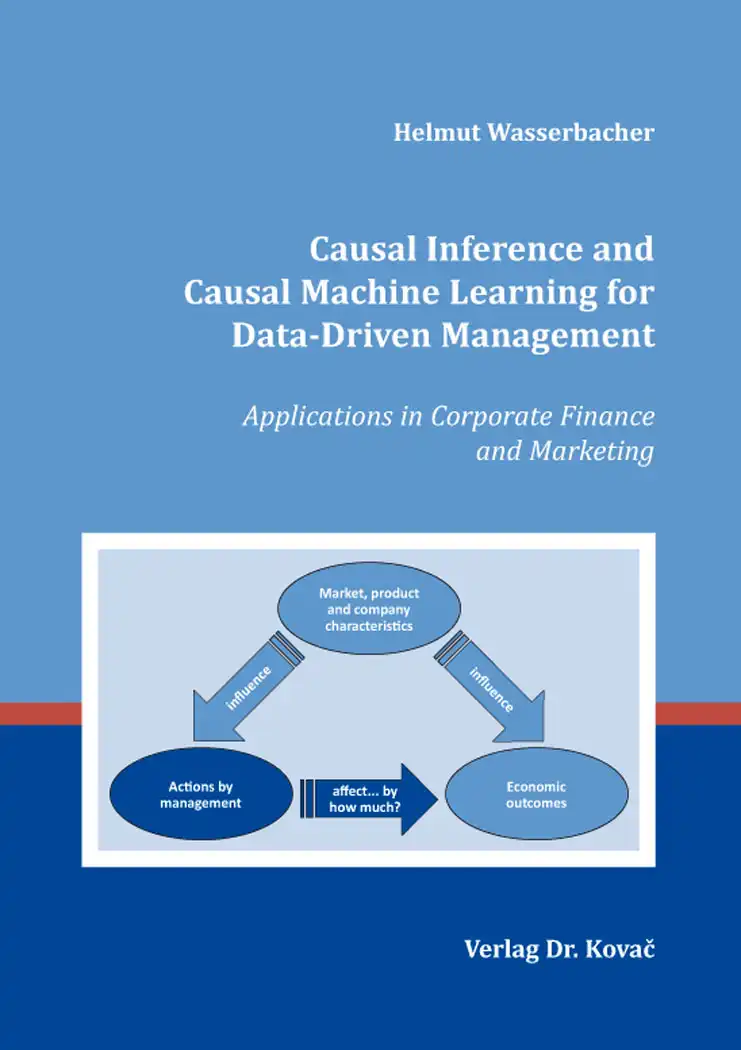Helmut WasserbacherCausal Inference and Causal Machine Learning for Data-Driven Management
Applications in Corporate Finance and Marketing
– in englischer Sprache –
Schriftenreihe innovative betriebswirtschaftliche Forschung und Praxis, Band 578
Hamburg 2024, 360 Seiten
ISBN 978-3-339-13946-7 (Print)
ISBN 978-3-339-13947-4 (eBook)
Rezension
[…] Die Verfügbarkeit unfassbar umfassender und vielfältiger Datensätze (big data) kann sich als Segen und Fluch zugleich erweisen, wie die vorliegende Dissertation eines international agierenden Managers zeigt, der selbst an der Schnittstelle von Naturwissenschaft, Finanzen und prädiktiven Technologien sitzt.
[…]
Wasserbacher warnt […] vor […] einer kritiklosen Anwendung derartiger Techniken und Werkzeuge. Denn ansonst kann es zu fragwürdigen Schlussfolgerungen kommen, sofern dem datengetriebenen Management keine Werkzeuge zur Erstellung passender Kausalfragen und zur Überprüfung von deren Anwendung zugrunde liegen, um die entsprechende Anwendungspraxis begleiten und bei Bedarf lenken zu können.
[…]
Werden die einschlägigen Werkzeuge quasi „von der Stange“ – also ohne sie den konkreten Umständen und Erfordernissen anzupassen – angewandt, so können die auf ihnen basierenden unternehmerischen Entscheidungen scheitern.
[…]
Während Wasserbacher die Entstehung der drei Forschungsarbeiten aus dem „Innenleben eines Unternehmens“ unterstreicht, sieht er zum Thema KI-Regulierung große Relevanz für die Leser(innnen) der ÖZK, zumal mit dem bereits oben erwähnten EU AI Act „die weltweit erste ‚horizontale‘ KI-Regulierung und Aufsichtspflicht eingeführt“ werde, was aber Hintergrundwissen über KI als Technologie erforderlich mache.
[…]
Die hier vermittelten Einsichten aus der vordersten Front eines Managers können dabei wertvolle Dienste leisten.
Zum Inhalt
The availability of large amounts of data, coupled with artificial intelligence and machine learning as suitable techniques to exploit them, has led to increasing interest in data-driven management. Data are turned into insights, and insights into management decisions.
In the midst of this passion for artificial intelligence, practitioners must remain aware that most machine learning methods maximize predictive performance. This is not the same as identifying causal patterns. Outside a valid causal framework, machine learning will lead to flawed conclusions about causal effects, and thus to incorrect decisions.
Data-driven management requires appropriate tools for causal questions. This book discusses in-depth three concrete examples in the areas of corporate finance and marketing.
- In financial forecasting, planning and analysis (FP&A), machine learning appears well suited for the highly automated extraction of information from large amounts of data. However, FP&A practitioners need to distinguish between forecasting tasks and tasks related to planning and resource allocation. Off-the-shelf machine learning typically fails for causal inference and is not suited for planning and resource allocation.
- In pharma marketing, the field force traditionally plays an important role. However, does a traditional field force still add value in an otherwise digital and virtual marketing mix? To answer this question, the impact of a field force within an omnichannel strategy is evaluated in a business experiment.
- The third use case applies double machine learning to the capital structure puzzle and credit ratings. Double machine learning performs data-driven variable selection out of a large set of individual company characteristics and models their relationship with leverage and credit ratings without any strong assumption about the underlying functional form. This allows to quantify the causal effect of credit ratings, along the rating scale, on the leverage ratio.
